- Bài Tập Chuyên Sâu Tiếng Anh 9 Unit 1 Local Environment Có Đáp Án
- Bài Tập Chuyên Sâu Tiếng Anh 9 Unit 2 City Life Có Đáp Án
Bài tập chuyên sâu Tiếng Anh 9 unit 2 City life có đáp án được soạn dưới dạng file word và PDF gồm 22 trang. Các bạn xem và tải về ở dưới.
UNIT 2. CITY LIFE
I. VOCABULARY
| Stt | Word | Type | Pronunciation | Meaning |
| 1 | bustling | (adj) | /ˈbʌslɪŋ | hối hả, nhộn nhịp, náo nhiệt |
| E.g. She is always bustling about the house.
Cô ấy lúc nào cũng hối hả về nhà cửa. |
||||
| 2 | carry out | (v) | /ˈkæri aʊ/ | tiến hành |
| E.g. These tests have been carried out on the patient.
Những xét nghiệm này đã được thực hiện trên bệnh nhân |
||||
| 3 | come down with | (phr.v) | /kʌm daʊn wɪð/ | bị nhiễm |
| E.g. I think I’m coming down with flu.
Tôi nghĩ tôi đã bị nhiễm cúm. |
||||
| 4 | concrete jungle | (n) | /ˌkɒŋkriːt ˈdʒʌŋɡl/ | rừng bê tông (miêu tả khu vực có nhiều nhà cao tầng. |
| E.g. We survived in a concrete jungle.
Chúng tôi sống sót trong một khu rừng bê tông. |
||||
| 5 | congested | (adj) | /kənˈdʒestɪd/ | tắc nghẽn |
| E.g. The city streets were congested with vehicles.
Các đường phố trong thành phố bị tắc nghẽn bởi xe cộ. |
||||
| 6 | construction site | (n) | /kənˈstrʌkʃn saɪt/ | công trường xây dựng |
| E.g. Green fences were put up around the construction site.
Hàng rào xanh được dựng lên xung quanh công trường xây dựng. |
||||
| 7 | get around | (phr.v) | /get əˈraʊnd/ | đi lại, đi xung quanh |
| E.g. We had to use public transport to get around.
Chúng tôi phải sử dụng phương tiện công cộng để đi lại. |
||||
| 8 | forbidden | (adj) | /fəˈbɪdn/ | bị cấm |
| E.g. Photography is strictly forbidden in the museum.
Chụp ảnh bị nghiêm cấm trong bảo tàng. |
||||
| 9 | fabulous | (adj) | /ˈfæbjələs/ | tuyệt vời, tuyệt diệu |
| E.g. The food looks fabulous.
Món ăn trông thật tuyệt vời. |
||||
| 10 | hygiene | (n) | /ˈhaɪdʒiːn/ | vệ sinh, vấn đề vệ sinh |
| E.g. Many skin diseases can be prevented by good personal hygiene.
Nhiều bệnh ngoài da có thể được ngăn ngừa bằng cách vệ sinh cá nhân tốt. |
||||
| 11 | itchy | (adj) | /ˈɪtʃi/ | bị ngứa |
| E.g. I feel itchy all over.
Tôi cảm thấy ngứa khắp người. |
||||
| 12 | leftover | (n) | /ˈleftəʊvər/ | thức ăn thừa |
| E.g. Leftover food attracts flies.
Thức ăn thừa thu hút ruồi. |
||||
| 13 | liveable | (adj) | /ˈlɪvəbl/ | đáng sống |
| E.g. It’s one of the most liveable cities in the US.
Đây là một trong những thành phố đáng sổng nhất nước Mỹ |
||||
| 14 | metro | (n) | /ˈmetrəʊ/ | hệ thống tàu điện ngầm |
| E.g. He likes to travel on the metro.
Anh ấy thích đi du lịch bằng tàu điện ngầm. |
||||
| 15 | pricey | (adj) | /ˈpraɪsi/ | đắt đỏ |
| E.g. The menu may seem pricey, but the food is actually good value for money.
Thực đơn có vẻ đắt tiền nhưng đồ ăn thực sự rất đáng đồng tiền bát gạo. |
||||
| 16 | process | (v) | /ˈprəʊses | xử lý |
| E.g. Blueberries are processed into juice or sauce.
Quả việt quất được chế biến thành nước ép hoặc nước sốt. |
||||
| 17 | public amentities | (n) | /ˈpʌblɪk əˈmiːnəti/ | Những tiện ích công cộng |
| E.g. People like living in this city because they care about public amenities and public services. Mọi người thích sống ở thành phố này vì họ quan tâm đến các tiện ích công cộng và dịch vụ công cộng | ||||
| 18 | rush hour
= peak hour |
(n) | /ˈrʌʃ aʊər/
= /piːk aʊər/ |
giờ cao điểm |
| E.g. Don’t travel at rush hour.
Đừng đi lại vào giờ cao điểm. |
||||
| 19 | reliable | (adj) | /rɪˈlaɪəbl | đáng tin cậy |
| E.g. We are looking for someone who is reliable and hard-working.
Chúng tôi đang tìm kiếm một người đáng tin cậy và chăm chỉ. |
||||
| 20 | metropolitan | (adj) | /ˌmetrəˈpɒlɪtən/ | (thuộc) đô thị, thủ phủ |
| E.g. He was drawn to the metropolitan glamour and excitement of Paris.
Anh ấy bị thu hút bởi vẻ đô thị và sôi động của thủ đô Paris |
||||
| 21 | multicultural | (adj) | /ˌmʌltiˈkʌltʃərəl/ | đa văn hóa |
| E.g. We live in a multicultural society.
Chúng ta đang sống trong một xã hội đa văn hóa. |
||||
| 22 | variety | (n) | /vəˈraɪəti/ | sự phong phú, đa dạng, nhiều |
| E.g. He resigned for a variety of reasons.
Ông ấy đã từ chức vì nhiều lý do. |
||||
| 23 | grow up | (phr.v) | /ɡrəʊ ʌp/ | lớn lên, trưởng thành |
| E.g. She grew up in Boston.
Cô ấy lớn lên ở Boston. |
||||
| 24 | drop-off time | (n) | /ˈdrɒp-ɒf taɪm/ | giờ đưa con đi học |
| pick-up time | (n) | /pɪk-ʌp taɪm/ | giờ đón con đi học về | |
| E.g. She suggests that the city authorities not allow cars at school gates at drop-off and pick-up times.
Cô ấy đề nghị chính quyền thành phố không cho phép ô tô vào cổng trường vào giờ đưa đón con. |
||||
| 25 | urban | (adj) | /ˈɜːbən/ | (thuộc) đô thị |
| E.g. Pollution has reached disturbingly high levels in some urban areas.
Ô nhiễm đã đạt mức cao đáng lo ngại ở một số khu vực đô thị. |
||||
| 26 | downtown | (adj) | /ˌdaʊnˈtaʊn/ | (thuộc) trung tâm thành phố, khu thương mại |
| E.g. Let’s go downtown for shopping.
Chúng mình hãy xuống phố mua sắm đi |
||||
| 27 | skyscraper | (n) | /ˈskaɪskreɪpər/ | nhà cao chọc trời |
| E.g. The restaurant is at the top of one of the biggest downtown skyscrapers.
Nhà hàng nằm trên đỉnh của một trong những tòa nhà chọc trời lớn nhất ở trung tâm thành phố. |
||||
| 28 | sky train | (n) | /skaɪ treɪn/ | tàu điện trên không |
| E.g. Have you ever traveled by sky train?
Bạn đã bao giờ đi du lịch bằng tàu trên cao chưa? |
||||
| 29 | stuck | (adj) | /stʌk/ | bị mắc kẹt |
| E.g. Seven of us were stuck in the lift for over an hour.
Bảy người chúng tôi đã bị mắc kẹt trong thang máy hơn một giờ. |
||||
| 30 | affordable | (adj) | /əˈfɔːdəbl/ | (giá cả) phải chăng |
| E.g. We offer quality products at affordable prices.
Chúng tôi cung cấp các sản phẩm chất lượng với giá cả phải chăng |
||||
| 31 | tram | (n) | /træm/ | xe điện |
| E.g. There is easy access to the centre of the city by tram.
Có thể dễ dàng đi đến trung tâm thành phố bằng xe điện. |
||||
| 32 | underground | (n) | /ˌʌndəˈɡraʊnd/ | (hệ thống) tàu điện ngầm |
| E.g. It’s convenient to travel by underground.
Thật thuận tiện để đi du lịch bằng tàu điện ngầm. |
||||
II. WORD FORMATION
| Words | Related words | Transcription | Meaning |
| congested (adj)
tắc nghẽn |
congestion (n) | /kənˈdʒestʃən/ | sự tắc nghẽn |
| reliable (adj)
đáng tin cậy |
reliance (n) | /rɪˈlaɪəns/ | sự tin cậy, sự tín nhiệm |
| reliably (adv) | /rɪˈlaɪəbli/ | chắc chắn, đáng tin cậy | |
| reliability (n) | /rɪˌlaɪəˈbɪləti/ | sự đáng tin cậy, tính đáng tin | |
| reliant (adj) | /rɪˈlaɪənt/ | đáng được tin cậy, tín nhiệm | |
| metropolitan (adj) (thuộc) thủ đô, trung tâm | metropolis (n) | /məˈtrɒpəlɪs/ | thủ đô, thủ phủ |
| itchy (adj) ngứa, ngứa ngáy | itch (n) | /ɪtʃ/ | cảm giác ngứa ngáy |
| itch (v) | /ɪtʃ/ | ngứa | |
| forbidden (adj)
bị cấm |
forbid (v) | /fəˈbɪd/ | cấm, ngăn cấm |
| forbidding (adj) | /fəˈbɪdɪŋ/ | trông gớm giếc, kinh khủng | |
| forbiddingly (adv) | /fəˈbɪdɪŋli/ | một cách gớm giếc, kinh khủng | |
| affordable (adj)
giá cả phải chăng |
afford (v) | /əˈfɔːd/ | có điều kiện, có khả năng làm gì |
| affordability (n) | /əˌfɔːdəˈbɪləti | có đủ điều kiện kinh tế, có khả năng kinh tế | |
| affordably (adv) | /əˈfɔːdəbli/ | hợp túi tiền | |
| liveable (adj)
đáng sống |
live (v) | /lɪv/ | sống |
| live (adj) | /laɪv/ | đáng sống | |
| live (adv) | /laɪv/ | phát sóng trực tiếp | |
| life (n) | /laɪf/ | cuộc sống | |
| pricey (adj)
đắt đỏ |
price (n) | /praɪs/ | giá, giá cả |
| price (v) | /praɪs/ | đặt giá, định giá | |
| cut-price (adj) | /ˌkʌt ˈpraɪs | giảm giá |
III. GRAMMAR
1. DOUBLE COMPARATIVES (SO SÁNH KÉP)
So sánh kép (Double Comparatives) là dạng so sánh gồm có hai mệnh đề song song, cấu trúc này được sử dụng khi người nói cần diễn tả về việc một sự thay đổi của vế A dẫn đến một tác động song song tới người hay vật khác ở vế B.
E.g. The older she is, the slower she is.
(Càng lớn tuổi, bà ấy càng chậm chạp.)
1.1. Cấu trúc so sánh kép: (càng… càng…)
1.1.1. Tính từ, trạng từ ngắn:
the adj/adv + er + S + V, the adj/adv + er + S + V
E.g. The harder he studies, the wiser he becomes.
(Anh ta càng học nhiều, anh ta càng trở nên khôn ngoan hơn.)
The bigger the house is, the higher the rent is.
(Nhà càng to thì giá thuê càng cao.)
1.1.2. Tính từ, trạng từ dài:
the more + adj/adv + s + V, the more + adj/adv + S + V
E.g. The more beautiful she is, the more modest she becomes.
(Càng xinh đẹp cô ay lại càng khiêm tốn.)
The more expensive the car is, the more comfortable it is.
(Ô tô càng đắt tiền thì nó càng thoải mải dễ chịu.)
1.1.3. Với danh từ
the more + noun + S + V, the more + noun + S + V
E.g. The more electricity you use, the higher bill you will have.
(Bạn sử dụng càng nhiều điện, hóa đơn tiền điện của bạn càng cao.)
The more money she has, the more clothes she buys.
(Càng có nhiều tiền, cô ấy càng mua nhiều quần áo.)
1.2. Cấu trúc so sánh đồng tiến: CÀNG NGÀY CÀNG
1.2.1. Tính từ và trạng từ ngắn:
adj/adv + er + and + adj + er
E.g. They work harder and harder.
(Họ làm việc càng ngày càng chăm chỉ.)
It’s hotter and hotter.
(Trời càng ngày càng nóng.)
1.2.2. Tính từ và trạng từ dài:
more and more + adj/adv
E.g. Life in the city is more and more stressful.
(Cuộc sống ở thành thị càng ngày càng căng thẳng.)
My daughter is more and more beautiful.
(Con gái tôi càng ngày càng xinh đẹp.)
2. PHRASAL VERBS (CONTINUE) – CỤM ĐỘNG TỪ
Chúng ta tiếp tục học thuộc một số cụm động từ thông dụng sau.
get around: đi lại, thăm thú xung quanh
| carry out: tiến hành |
| come down with: bị ốm, mắc bệnh |
| hang out with: đi chơi với ai |
| cut down on: cắt giảm |
| make sth up: bịa đặt, dựng chuyện |
| make up one’s mind: quyết định |
| pass down: lưu truyền (thế hệ này sang thế hệ khác) |
| pick someone up: đón ai |
| pick sth up: lượm, nhặt cái gì lên |
| move on to sth: chuyển tiếp sang cái gì |
| put sth down: ghi chú cái gì |
| put someone down: hạ thấp, đánh giá thấp ai đó |
| put someone off: làm ai mất hứng, không vui |
| put sth oft’: trì hoãn, tạm dừng việc gì |
| put sth on: mặc cái gì |
| put sth away: cất cái gì đó đi |
| put up with sb/sth; chịu đựng, tha thứ cho ai, cái gì |
| pull down: phá hủy, đập, dỡ bỏ |
| run into sb/sth: tình cờ gặp, vô tình gặp/ thấy ai, cái gì = come across/ bump into |
| run out: cạn kiệt, hết = to be used up |
| run out of sth: hết thứ gì |
| set sb up: gài tội ai |
| set up sth: thành lập, thiết lập cái gì |
| set off/out for somewhere: khởi hành đi đâu |
| settle down: ổn định cuộc sống tại chỗ nào đó |
| show off: khoe khoang = boast off |
| show up: xuất hiện, có mặt = turn up |
| show sb around: dẫn ai đi thăm quan xung quanh |
| slow down: chậm lại |
| speed up: tăng tốc |
| stand for: viết tắt của |
| take away: lấy đi, mang đi |
| take sth away from sb: lấy đi, tước đoạt đi cái gì của ai = deprive sth of sb |
| take off: cất cánh (máy bay) |
| take sth off: cởi cái gì đó |
| take over: tiếp quản, kế tục, giành lấy, kế thừa |
| take on: đảm nhận, gánh vác |
| tell someone off: la mắng ai đó |
| think over: cân nhắc, suy nghĩ kỹ, xem xét = consider |
| turn around: quay đầu lại |
| turn down: giảm âm lượng/ nhiệt độ; từ chối (một lời mời) |
| turn off: tắt |
| turn on: bật, mở |
| turn up: tăng âm lượng/ nhiệt độ; xuất hiện |
| wake up: (tự) thức dậy (còn nằm trên giường) |
| wake someone up: đánh thức ai dậy |
| warm up: khởi động, hâm nóng (thức ăn) |
| wear out: mòn, làm mòn |
| work out: tập thể dục, có kết quả tốt đẹp |
| work sth out: suy ra được cái gì |
IV. PRONUNCIATION
DIPTHONG REVISION: Sound /aʊ/; /əʊ/ and /eə/
1. SOUND /aʊ/
1.1. Cách phát âm /aʊ/
Âm /aʊ/ sẽ được tạo thành bởi âm /a/ và /ʊ/. Do đó, bạn chỉ cần “đọc nối từng nguyên âm lẻ lại với nhau, âm trước đọc dài hơn âm sau”:
Bước 1: Miệng mở rộng và to, lưỡi hạ thấp và phát âm âm /a/.
Bước 2: Miệng tròn dần, kéo lười về sau phát âm /ʊ/, phát âm /a/ dài, /ʊ/ ngắn và nhanh.
Dưới đây là hình ảnh minh hoạ:
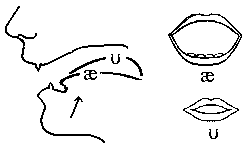
Các em luyện phát âm các ví dụ sau:
| Từ vựng | Từ loại | Phiên âm | Ý nghĩa |
| about | pre | /əˈbaʊt/ | về, khoảng |
| count | v | /kaʊnt/ | đếm |
| sound | n | /saʊnt/ | âm thanh |
| mountain | n | /maʊtn/ | núi |
1.2. Dấu hiệu nhận biết âm /aʊ/
1.2.1. Từ có chứa “ou” thường được phát là /aʊ/.
| Từ vựng | Từ loại | Phiên âm | Ý nghĩa |
| around | pre | /əˈraʊnd/ | xung quanh |
| cloud | n | /klaʊnd/ | đám mây |
| mouth | n | /maʊθ/ | miệng |
| county | n | /ˈkaʊnti/ | hạt, tỉnh |
| plough | n | /plaʊ/ | cái cày |
| fountain | n | /ˈfaʊntən/ | vòi phun nước |
| south | n | /saʊθ/ | hướng Nam, phương Nam |
| doubt | n | /daʊt/ | sự nghi ngờ |
| loud | adj | /laʊd/ | (âm thanh) to, ầm ĩ |
1.2.2. Từ có chứa “ow” thường được phát là /aʊ/
| Từ vựng | Từ loại | Phiên âm | Ý nghĩa |
| power | n | /ˈpaʊə(r)/ | sức mạnh, quyền lực |
| crawn | n | /craʊn/ | vương miện |
| powder | n | /ˈpaʊdə(r) | bột |
| plow | n | /plaʊ/ | cái cày |
| coward | adj | /kaʊəd/ | hèn nhát |
| tower | n | /ˈtaʊə(r)/ | tòa tháp |
| drown | v | /draʊd/ | chết đuối, đuối nước |
| fowl | n | /faʊl/ | gà, thịt gà |
| brow | n | /braʊ/ | lông mày |
2. SOUND /əʊ/
2.1. Cách phát âm âm /əʊ/
Nguyên âm đôi /əʊ/ là sự kết hợp của âm /ə/ và âm /ʊ/. Khi phát âm nguyên âm đôi này, chúng ta chuyển dần từ âm /ə/ sang âm /ʊ/ với một số lưu ý như sau:
Môi: chuyển khẩu hình môi từ hơi mở đến khi thành một hình tròn nhỏ.
Lưỡi: đưa lưỡi lên phía trên miệng rồi dần lùi về phía sau.
Độ dài hơi: phần âm /ə/ trong nguyên âm đôi được phát âm rõ, dài và mạnh so với phần âm /ʊ/.
Dưới đây là hình ảnh minh họa cách phát âm âm /əʊ/:
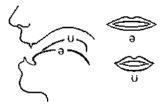
Các em luyện phát âm các ví dụ sau:
| Từ vựng | Từ loại | Phiên âm | Ý nghĩa |
| shoulder | n | /ˈʃəʊldər/ | vai |
| road | n | /rəʊd/ | con đường |
| potato | n | /pəˈteɪtəʊ/ | khoai tây |
| slow | adj | /sləʊ/ | chậm |
2.2. Dấu hiệu nhận biết âm /əʊ/
2.2.1. “o” đứng ở cuối một từ
| Từ vựng | Từ loại | Phiên âm | Ý nghĩa |
| ago | adv | /əˈɡəʊ/ | trước đây, về trước |
| cargo | n | /ˈkɑːɡəʊ/ | hàng hóa |
| combo | n | /ˈkɒmbəʊ/ | sự kết hợp |
| piano | n | /piˈænəʊ/ | đàn piano |
| mango | n | /ˈmæŋɡəʊ/ | xoài |
| radio | n | /ˈreɪdiəʊ/ | máy thu thanh |
| echo | n | /ˈekəʊ/ | tiếng vang, tiếng dội |
2.2.2. “oa” khi ở trong một từ có một âm tiết tận cùng bằng một hoặc hai phụ âm có thể được phát âm là /əʊ/
| Từ vựng | Từ loại | Phiên âm | Ý nghĩa |
| boat | n | /bəʊt/ | thuyền |
| coat | n | /kəʊt/ | áo khoác |
| coach | n | /kəʊtʃ/ | huấn luyện viên |
| goal | n | /gəʊl/ | mục tiêu |
| roast | n | /rəʊst/ | thịt nướng |
| loaf | n | /ləʊʃ/ | bánh mì |
| coal | n | /kəʊl/ | than đá |
2.2.3. “ow ” được phát âm là /əʊ/
| Từ vựng | Từ loại | Phiên âm | Ý nghĩa |
| grow | v | /ɡrəʊ/ | phát triển |
| crow | n | /crəʊ/ | con quạ |
| row | n | /rəʊ/ | dòng, hàng |
| show | v | /ʃəʊ/ | trình diễn |
| snow | n | /snəʊ/ | tuyết |
| pillow | n | /ˈpɪləʊ/ | cái gối |
| rainbow | n | /reɪnbəʊ/ | cầu vồng |
| glow | v | /ɡləʊ/ | ánh sáng rực rỡ |
| mow | n | /məʊ/ | cắt cỏ |
3. SOUND /eə/
3.1. Cách phát âm âm /eə/
Âm /eə/ là sự kết hợp giữa âm /e/ và âm /ə/. Để phát âm âm này ta làm như sau:
Bước 1: Hơi kéo hai khóe miệng sang hai bên, đặt lưỡi ở độ cao trung bình để phát âm âm /e/.
Bước 2: Sau đó thu hai khóe miệng về, kéo lưỡi về phía sau để phát âm âm /ə/.
Dưới đây là hình ảnh minh hoạ khẩu hình miệng khi phát âm âm /eə/
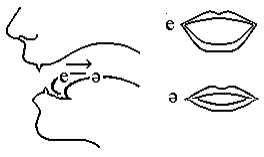
Các em luyện phát âm các ví dụ sau:
| Từ vựng | Từ loại | Phiên âm | Ý nghĩa |
| bear | n | /beə(r)/ | con gấu |
| stare | v | /steə(r)/ | nhìn chằm chằm |
| pear | n | /peə(r)/ | quả lê |
| rare | adj | /reə(r)/ | hiếm |
3.2. Dấu hiệu nhận biết âm /eə/.
3.2.1. Từ có chứa cụm “are” được phát âm thành /eə/.
| Từ vựng | Từ loại | Phiên âm | Ý nghĩa |
| care | n | /keə(r)/ | sự quan tâm, chăm sóc |
| share | n, v | /ʃeə(r)/ | sự đóng góp, chia sẻ |
| compare | v | /kəmˈpeə(r)/ | so sánh, đối chiếu |
| prepare | v | /prɪˈpeə(r) | chuẩn bị, sửa soạn |
| stare | v | /steə(r)/ | nhìn chằm chằm, đăm đăm nhìn |
| scare | v | /skeə(r)/ | làm sợ, kinh hãi |
| shareholder | n | /ˈʃeəhəʊldə(r)/ | cổ đông |
| careful | adj | /ˈkeəfl/ | cẩn thận |
| rarely | adv | /ˈreəli/ | hiếm khi, ít khi |
| snare | n | /sneə(r)/ | bẫy, lưỡi câu |
3.2.2. Từ có chứa “air” được phát âm là /eə/
| Từ vựng | Từ loại | Phiên âm | Ý nghĩa |
| stair | n | /steə(r)/ | cầu thang |
| hair | n | /heə(r)/ | tóc |
| chair | n | /tʃeə(r)/ | ghế |
| repair | v | /rɪˈpeə(r) | sửa chữa |
| airfare | n | /ˈeəfeə(r)/ | giá vé máy bay |
| staircase | n | /ˈsteəkeɪs/ | cầu thang |
| fairy | n | /ˈfeəri/ | nàng tiên |
| pairing | n | /ˈpeərɪŋ/ | sự ghép đôi |
| haircut | n | /ˈheəkʌt/ | kiểu tóc, cắt tóc |
| repairman | n | /rɪˈpeəmæn/ | thợ sửa chữa |
3.2.3. Từ có chứa cụm “ear”, “ei” cũng được phát âm là /eə/ trong một vài trường hợp.
| Từ vựng | Từ loại | Phiên âm | Ý nghĩa |
| swear | v | /sweə(r)/ | thề, tuyên thệ |
| pear | n | /peə(r)/ | quả lê |
| tear | v | /teə(r)/ | xé, rách |
| wear | v | /weə(r)/ | mặc, đeo |
| heir | n | /eə(r)/ | người thừa kế |
| bear | n | /beə(r)/ | con gấu |
| bearable | adj | /beərəbəl/ | chịu được, có thể chịu đựng được |
| their | pro | /ðeə(r) | của họ |
IV. PRATICE
Exercise 1: Read the following words and put them in the correct column.
| allow | airport | rainbow | remote | parent | ||
| nightmare | overcome | downtown | homegrown | accountant | ||
| cooperate | cloudy | around | prepare | motorbike | ||
| compare | underground | browse | upstairs | fountain | ||
| /aʊ/ | /əʊ/ | /eə/ | ||||
Exercise 2: Circle the words with /aʊ/, underline the words with /əʊ/ and double underline the words with /eə/.
1. My parents are at the airport at the moment.
2. The restaurant was crowded, so we decided to eat outside instead.
3. After spending the whole day at the funfair, we were tired.
4. We live in an old house with a narrow garden.
5. Tomorrow, we are going to the park for a picnic with our friends.
6. My sister has long brown hair and a straight nose.
7. I am learning about rainbows in science class now.
8. Let me show you how to prepare a simple salad for lunch.
9. Can you buy some pears and tomatoes from the grocery store?
10. Linda is too scared to go on the roller coaster at the amusement park.
Exercise 3. Look at the photos and put the correct word/phrases under them.
| metro | concrete jungle | construction site | sky train |
| itchy eyes | congested road | entertainment centre | dusty |
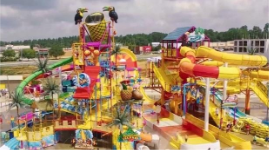 |
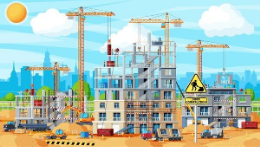 |
||
| 1. ____________________ | 2. ____________________ | ||
 |
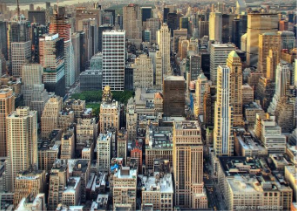 |
||
| 3. ____________________ | 4. ____________________ | ||
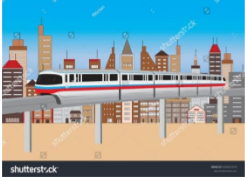 |
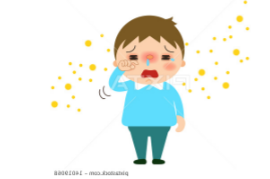 |
||
| 5. ____________________ | 6. ____________________ | ||
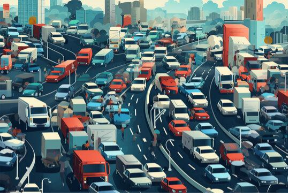 |
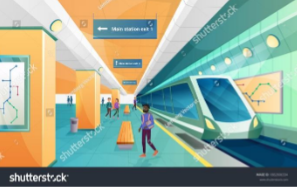 |
||
| 7. ____________________ | 8. ____________________ | ||
Exercise 4. Complete the sentences with the words/ phrases in the box in Exercise 3.
1. I wear a mask to protect myself from breathing in the ___________________ air in the city.
2. Wearing contact lenses sometimes leads to ___________________ by the end of the day.
3. The ___________________ is an underground railway system in a city, often used for public transportation
4. The city is often called a ___________________ because of all the tall buildings.
5. My dad is a construction worker, so he often visits the ___________________.
6. The ___________________ is a fun place to hang out with friends and family.
7. The ___________________ is an elevated train system that runs above the city streets.
8. Manh feels stressed when he has to drive on the ___________________.
Exercise 5: Circle the odd one out.
| 1. A. tram | B. bus | C. metro | D. city |
| 2. A. busy | B. crowd | C. noisy | D. modem |
| 3. A. underground | B. restaurant | C. shop | D. cinema |
| 4. A. downtown | B.suburb | C. liveable | D. town |
| 5. A. amenity | B. bustling | C. dangerous | D. convenient |
| 6. A. taxi | B. around | C. train | D. car |
| 7. A. expensive | B. quiet | C. liveable | D. building |
| 8. A. down | B. get | C. come | D. go |
| 9. A. nearer | B. smaller | C. worker | D. taller |
| 10. A. polluted | B. noise | C. light | D. water |
Exercise 6: Complete the sentences with the phrasal verbs in the box. Each phrasal verb can be used twice. You can change the form of the verbs when necessary.
| get around | hang out with | cut down on | carry out | come down with |
1. My friends ride their bikes to ___________________ the city every weekend.
2. We turn off lights when we leave a room to ___________________ electricity.
3. Linda and Anna are ___________________ a project to plant trees in the park.
4. Yesterday, I ___________________ a stomach ache after eating too much candy.
5. Jane is excited to ___________________ a plan to go camping with her family.
6. We enjoy ___________________ our neighbours in the evening.
7. Oscar couldn’t go to school last Monday because he ___________________ a fever.
8. We should not throw trash in the river to ___________________ water pollution.
9. I can’t ___________________ my friends because I have to do my homework.
10. If you want to ___________________ London, you can take a bus.
Exercise 7: Choose the correct option to complete the sentences.
1. The ___________________ the exam is, the less confident I feel.
A. more difficulter B. difficulter C. difficult D. more difficult
2. The more colourful the flowers are, the ___________________ the garden looks.
A. prettyer B. prettier C. pretty D. more pretty
3. The ___________________ the rain is, the wetter she becomes.
A. heavier B. heavyer C. more heavy D. more heavier
4. The hotter the weather is, the ___________________ I feel.
A. comfortablest B. less comfortabler C. comfortabler D. less comfortable
5. The more crowded the restaurant is, the ___________________ we have to wait.
A. more long B. longer C. more longer D. long
6. The ___________________ the mountain is, the harder it is to climb.
A. taller B. more tall C. tall D. more taller
7. The closer the deadline gets, the ___________________ John feels.
A. stressed B. more stresseder C. more stressed D. stresseder
8. The darker the night is, the ___________________ the shadows become.
A. scaryer B. scarier C. more scarier D. scary
9. The busier the street is, the less ___________________ the walk becomes.
A. enjoyablest B. more enjoyable C. enjoyabler D. enjoyable
10. The clearer the sky is, the ___________________ the stars shine at night.
A. brighter B. bright C. more brightest D. more brighter
11. The more tired she is, the less ___________________ she becomes.
A. more patienter B. patienter C. patient D. more patient
12. The ___________________ the movie is, the ___________________ I feel.
A. long – more bored B. more long – more bored
C. longer – boreder D. longer – more bored
13. The ___________________ the computer is, the ___________________ the price you have to pay.
A. more modem – higher B. modemer – higher
C. more modem – more high D. modemer – more high
14. The ___________________ the music is, the less ___________________ my brother becomes.
A. louder – more focused B. more loud – focused
C. louder – focused D. more loud – focuseder
15. The ___________________ the weather is, the ___________________ clothes you need to wear.
A. colder – warmer B. colder – more warm
C. more cold – warmer D. more cold – warm
Exercise 8: Complete the conversation with the words or phrases in the box.
| congested roads | more crowded | suburbs | entertainment |
| packed | concrete | hang out | sky train |
Emily: I can’t stand this city, Alex.
Alex: Why not?
Emily: It’s just a big (1) ___________________ jungle. There are too many people and it’s always so crowded.
Alex: Yeah, but that’s what makes it exciting! There are so many things to do here. You can go to the (2) ___________________ centre to watch movies, play games, and have fun with friends.
Emily: But the traffic is always terrible. I hate driving on (3) ___________________.
Alex: Well, have you tried taking the (4) ___________________? It’s much faster.
Emily: But then it’s so (5) ___________________ with people! I prefer walking even if it takes longer.
Alex: You sound like me before 1 moved here from the (6) ___________________. Trust me, you’ll get used to it.
Emily: I guess so, but sometimes it’s just too much. The (7) ___________________ it gets, the more annoyed I feel.
Alex: Just remember, we live in a busy city. Of course it’s going to be congested at times.
Emily: You’re right. Thanks for cheering me up, Alex.
Alex: You’re welcome, Emily. Whenever you feel overwhelmed by the city, just remember we can always (8) ___________________ with our friends and relax.
Exercise 9: Choose the underlined part A, B, C or D that needs correcting.
1. The more old Kim gets, the more thoughtful she becomes.
A. more B. gets C. more thoughtful D. becomes
2. The louder the music plays, the more exciteder the crowd becomes.
A. louder B. music C. exciteder D. becomes
3. The clearer the instructions are, the easyer the task becomes.
A. The B. clearer C. are D. easyer
4. The longer the line at the stoic is, the most impatient I become.
A. at B. the C. most impatient D. become
5. The dry the weather gets, the thirstier my mother becomes.
A. The B. dry C. thirster D. my
6. The thinner the ice gets, the more dangerous it becomes to walk on.
A. thinner B. gets C. more dangerous D. on
7. The most crowded the elevator is, the more uncomfortable I feel.
A. most crowded B. is C. uncomfortable D. on
8. The more expensive the restaurant is, the gooder the food tastes.
A. expensive B. is C. gooder D. tastes
Exercise 10: Choose the correct prepositions to complete the sentences.
1. We plan to carry ________ a survey to gather opinions from the community.
A. of B. around C. out D. in
2. My friends often get ________ the city by motorbike every Sunday.
A. for B. on C. with D. around
3. They are trying to cut down ________ unnecessary expenses to save money for their vacation.
A. on B. in C. to D. out
4. Mark prefers hanging out ________ his siblings rather than playing alone.
A. with B. on C. in D. to
5. Tom came down ________ food poisoning after eating at that new restaurant.
A. of B. on C. to D. with
6. My mother always picks me ________ after school.
A. by B. up C. to D. with
7. Lan visited her grandparents in another city ________ plane last month.
A. at B. to C. for D. by
8. We need to find ________ where the nearest supermarket is.
A. out B. to C. for D. of
9. I need to take care ________ my little brother while my parents are out.
A. on B. of C. in D. up
10. They always hang ________ with each other during lunch breaks.
A. at B. to C. out D. in
Exercise 11: Circle the correct word or phrase to complete each sentence.
1. The more (nervous / nervouser) she feels, the shakier her hands become.
2. The bigger the crowd is, (the harder / the more hard) it is to find someone.
3. The (more colourful / most colourful) the flowers in the garden are, the more attractive it becomes to visitors.
4. The more complicated the recipe is, the (more satisfying / satisfying) the taste becomes.
5. The sweeter the fruit tastes, the (juicier / more juicy) it is to bite into.
6. The (more excited / excited) the children get, the louder their laughter becomes.
7. The more colourful the sky becomes, the (prettier / prettiest) the sunset looks.
8. The (more difficult / difficulter) the assignment is, the more hard-working Ben needs to be.
9. The more unique the village is, (the greater / greater) the number of visitors it can attract.
10. The (darker / more dark) the room gets, the more nervous I feel.
11. The dirtier the lake is, the less (attractive / more attractive) it becomes.
12. The (more experienced / most experienced) the team is, the more successful the project tends to be.
13. The more patient the teacher is, (the more engaged / more engaged) the students become in learning.
14. The more enthusiastic the audience is, the (more energised / energised) the performer becomes.
15. The more confident they become, the (better / gooder) their chances of success are.
Exercise 12: Read the text and choose the correct options.
Traffic jams and pollution are two big problems in the city. Traffic jams occur when there are too many cars on the roads, making it difficult for people to move around quickly. To solve this, cities can encourage people to use public transportation, like buses or trains, instead of driving their own cars. This would reduce the number of vehicles on the roads, easing traffic congestion. Pollution is another issue in cities because there is too much dirty air from vehicles and factories. One solution for this problem is to plant more trees and create more green spaces in the city. Trees provide oxygen and clean the air. By increasing the number of trees, cities can improve air quality and make the environment healthier for everyone. In conclusion, we all need to work together to solve the problems of traffic and pollution. By using public transportation and starting green projects like planting trees, we can make our city environment more sustainable and enjoyable.
1. Which is a big problem in the city?
A. traffic jams B. pollution
C. high buildings D. Both A & B are correct.
2. What causes traffic jams in the city?
A. too many cars on the roads B. too many modem machines
C. too many factories D. too many trees
3. How can cities reduce traffic congestion according to the passage?
A. by encouraging more people to drive their own cars
B. by reducing the number of buses and trains
C. by promoting the use of public transportation
D. by building more roads for cars
4. What is suggested as a solution for pollution in cities?
A. increasing the number of factories
B. planting more trees and creating green spaces
C. encouraging more people to drive cars
D. using more fossil fuels for energy
5. What do trees provide?
A. noise pollution B. traffic congestion
C. oxygen and clean air D. water and dirty air
6. Which sentence is TRUE according to the passage?
A. Pollution is not a problem in cities.
B. Planting more trees is harmful for the environment.
C. We should work alone to solve the problems.
D. To avoid traffic jams, people should use public transport.
Exercise 13: Read the text carefully, then do the tasks.
My name is Nancy. I live in London, the capital of Britain. It’s a crowded city and it’s very noisy, especially in the centre. But there are many interesting things to see and do here. There are some fantastic museums and art galleries. I love going to the British Museum. And there are lots of great shops! You can buy everything here. I also like the nightlife. There are many good restaurants and bars. At the weekend, I often go to a club with my friends. I think that London is a really cool place to hang out with friends!
My best friend Helen lives in the countryside. She thinks London is terrible because it’s too bustling and expensive. She also thinks the people are unfriendly. She wants to live in the countryside forever! Helen says there’s nothing to do in London, but I don’t agree. For me, it’s a fantastic city. I love living here! The buildings and the way you can get around the city make it a truly unique place to reside.
A. Decide whether the following statements are true (T) or false (F).
| No. | Statements | T or F |
| 1. | London is the capital of Britain. | |
| 2. | The centre of London is crowded and noisy. | |
| 3. | Nancy finds London to be an interesting city with many things to see and do. | |
| 4. | There aren’t many good restaurants in London. | |
| 5. | Nancy rarely hangs out with her friends. | |
| 6. | Helen lives in the city. | |
| 7. | Helen thinks London is wonderful because it’s bustling and affordable. | |
| 8. | Helen prefers living in the countryside over the city. | |
| 9 | Nancy agrees with Helen that there’ s nothing to do in London. | |
| 10 | Nancy loves living in London. |
B. Read the text again and answer the questions.
1. What’ s Nancy’ s city like?
⟶ _____________________________________________________________
2. Where does Nancy like to go?
⟶ _____________________________________________________________
3. Are there many bars in London?
⟶ _____________________________________________________________
4. Where does Nancy often go at the weekend?
⟶ _____________________________________________________________
5. What does Helen think about the people in London?
⟶ _____________________________________________________________
6. Where does Helen want to live forever?
⟶ _____________________________________________________________
Exercise 14: Underline the mistake and rewrite the correct one.
1. The more complicated the puzzle gets, the long it takes to solve.
⟶ _____________________________________________________________
2. The most polluted the air gets, the harder it is to breathe.
⟶ _____________________________________________________________
3. Despite the crowded streets, Tom decided to get up downtown by motorbike.
⟶ _____________________________________________________________
4. We had to cancel our trip because our dad came up with the flu.
⟶ _____________________________________________________________
5. The cleaner the kitchen is, more inviting it looks.
⟶ _____________________________________________________________
6. The crowdeder the bus is, the longer the journey takes.
⟶ _____________________________________________________________
7. My brother enjoys hanging up with his colleagues at the local pub after work.
⟶ _____________________________________________________________
8. The more expensive the hotel gets, the most luxurious the amenities become.
⟶ _____________________________________________________________
9. The committee is working together to carry in a project to organise a charity event.
⟶ _____________________________________________________________
10. We must cut down out water pollution to protect marine life and ecosystems.
⟶ _____________________________________________________________
11. More complicated the problem becomes, the more confused she feels.
⟶ _____________________________________________________________
12. They came down to food poisoning after eating at that restaurant.
⟶ _____________________________________________________________
Exercise 15: Reorder the words to make correct sentences.
1. Lan/ her brother/ missed/ came down/ the concert/ because/ with/ a fever.
⟶ _____________________________________________________________
2. around/ rush hours./ to/ get/ the city/ It’s/ quickly/ during/ difficult
⟶ _____________________________________________________________
3. plan/ wants to/ a/ Rose/ her grades./ carry out/ for/ improving
⟶ _____________________________________________________________
4. In/ people./ public transport/ with/ always/ packed/ is/ the city,
⟶ _____________________________________________________________
5. the park/ like/ to hang/ at/ with/ my friends/ after school./ out/I
⟶ _____________________________________________________________
6. Kelly/ cut down/ by/ on/ reusable bags./ using/ wants to/ pollution
⟶ _____________________________________________________________
7. gets/ My sister/ around/ usually/ by/ Bangkok/ sky train.
⟶ _____________________________________________________________
8. is,/ The dirtier/ the water/ the less/ to drink./ safe/ it is
⟶ _____________________________________________________________
9. the dress/ is,/ The more/ it looks./ expensive/ the fancier
⟶ _____________________________________________________________
10. The more/ is,/ feel./I/ the hotter/ crowded/ the room
⟶ _____________________________________________________________
Exercise 16: Write complete sentences using double comparatives,
1. modern/ car/ be,/ expensive/ it/ cost
⟶ _____________________________________________________________
2. relaxing/ music/ be,/ calm/I/ become
⟶ _____________________________________________________________
3. beautiful/ garden/ be,/ happy/ it/ make/ me
⟶ _____________________________________________________________
4. organised/ my desk/ be,/ easy/ it/ be/ find/ things
⟶ _____________________________________________________________
5. near/I/ get/ airport,/ less/ anxious/I/ feel
⟶ _____________________________________________________________
6. developed/ city/ become,/ crowded/ it/ get
⟶ _____________________________________________________________
7. long/ film/ last,/ bored/ he/ become
⟶ _____________________________________________________________
8. balanced/ my diet/ be,/ healthy/ my skin/ look
⟶ _____________________________________________________________
9. large/ sofa/ be, comfortable/ it/ be/ sit on
⟶ _____________________________________________________________
10. cheap/ phone/ be,/ less/ advanced/ its features/ be
⟶ _____________________________________________________________
ĐÁP ÁN
UNIT 2: CITY LIFE
Exercise1.
| /aʊ/ | /əʊ/ | /eə/ |
| allow, cloudy,
underground, downtown, around, browse, fountain |
cooperate,
overcome, rainbow, remote, homegrown, motorbike |
nightmare, compare,
airport, prepare, upstairs, parent |
Exercise 2.
1. My parents are at the airport at the moment.
2. The restaurant was crowded, so we decided to eat outside instead.
3. After spending the whole day at the funfair, we were tired.
4. We live in an old house with a narrow garden.
5. Tomorrow, we are going to the park for a picnic with our friends
6. My sister has long brown hair and a straight nose.
7. I am learning about rainbows in science class now.
8. Let me show you how to prepare a simple salad for lunch.
9. Can you buy some pears and tomatoes from tne grocery store?
10. Linda is too scared to go on the roller coaster at the amusement park.
Exercise 3.
1. entertainment centre
2. construction site
3. dusty
4. concrete jungle
5. sky train
6. lichy eyes
7. congested road
8. metro
Exercise 4.
1. dusty
2. itchy eyes
3. metro
4. concrete jungle
5. construction site
6. entertainment centre
7. sky train
8. congested road
Exercise 5.
1. D
2. B
3. A
4. C
5. A
6. B
7. D
8. A
9. C
10. A
Exercise 6.
1. gel around
2. cut down on
3. carrying out
4. came down with
5. carry but
6. hanging out with
7. came down with
8. cut down on
9. hang out with
10. get around
Exercise 7.
1. D
2. B
3. A
4. D
5. B
6. A
7. C
8. B
9. D
10.
11. C
12. D
13. A
14. C
15. A
Exercise 8.
1.concrete 2.entertainment 3.congested roads 4.sky train 5.packed 6.suburbs 7.more crowded 8.hang ont
Exercise 9.
1. A (older)
2. C (excited)
3. D (easier)
4. C (more impatient)
5. B (drier)
6. A (thinner)
7. A (more crowded)
8. C (better)
Exercise 10.
1. 2. D 3. A 4. A 5. D 6. B 7. D 8. A 9.B 10. C
Exercise 11.
1. nervous 2. the harder 3. more colourful
4. more satisfying 5. juicier 6. more excited
7. prettier 8. more difficult 9. the greater
10. darker 11. attracive 12. more experienced
13. the more engaged 14. more energised 15. better
Exercise 12.
1. D
2. A
3. C
4. B
5. C
6. D
Exercise 13A.
1. True
2. True
3. True
4. False
5. False
6. False
7. False
8. True
9. False
10. True
Exercise 13B.
1. It’s crewded and noisy, especially in the centre.
2. She likes to go to the British Museum.
3. Yes, there are.
4. She often goes to a club with her friends.
5. Helen thinks the people in London are unfriendly.
6. Helen wants to live in the countryside forever.
Exercise 14.
1. long longer
2. up around
3. more the more
4. up out
5. in out
6. most more
7. up down
8. crowdeder more crowded
9. most more
10. More complicated The more complicated
11. to with
Exercise 15.
1. Lan missed the concert because her brother came down with a fever.
2. It’s difficult to get around the city quickly during rush hours.
3. Rose wants to carry out a plan for improving her grades.
4. In the city, public transport is always packed with people.
5. I like to hang out with my friends at the park after school.
6. Kelly wants to cut down on pollution by using reusable bags.
7. My sister usually gets around Bangiok by sky train.
8. The dirtier the wate is, the less safe it is to drink.
9. The more expensive the dross is, the fancier it looks.
10 The more crowaied the room is, the hotter I feel.
Exercise 16.
1. The more modern the car is, the more expensive it costs.
2. The more relaxing the music is, the calmer I become.
3. The more beautiful the garden is, the happier it makes me.
4. The more organised my desk is, the easier it is to find things.
5. The nearel I get to the airport, the less anxious I feel.
6. The more developed the city becomes, the more crowded it gets.
7. The longer the film lasts, the more bored he becomes.
8. The more balanced my diet is, the healthier my skin looks.
9. The larger the sofa is, the more comfortable it is to sit on.
10. The cheaper the phone is, the less advanced its features are.








